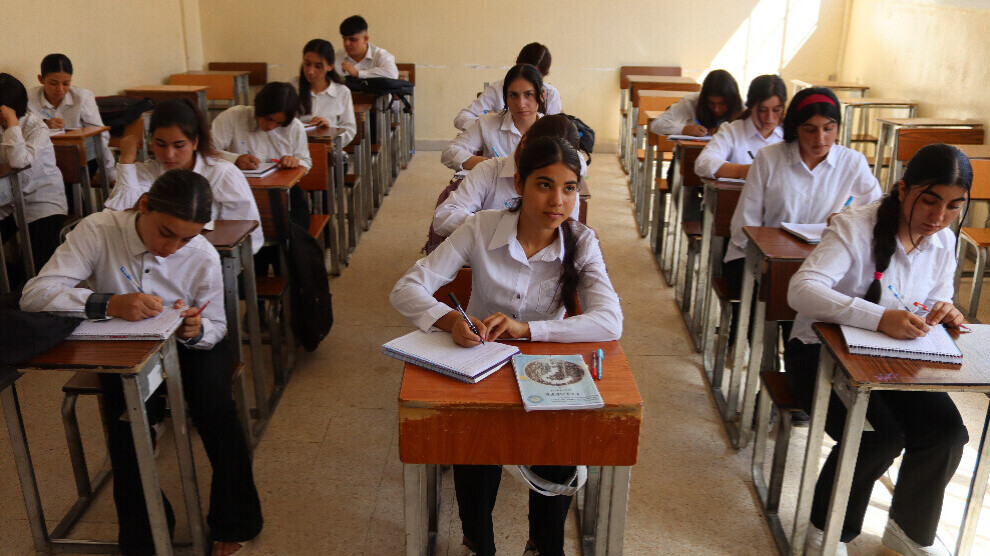Students from Kobanê: Receiving education in the mother tongue is a great opportunity
In Kobanê, students started the new year with great enthusiasm. For 12 years, students have been receiving education in their mother tongue, saying, "Studying in our language, culture, and history is a great privilege and opportunity for us.

NORŞAN ABDÎ
Kobanê – Northern and Eastern Syria, students began the 2025–2026 academic year on September 14. Thousands of children and young people receiving education in their mother tongue are going to school with great enthusiasm. In the city of Kobanê, which belongs to the Euphrates Canton and whose population is entirely Kurdish, schools and materials are in Kurdish. Therefore, from the first grade to the university level, Kurdish is dominant in the field of education.
"I have been receiving education in Kurdish for 12 years."
We met with students at the Martyr Hogir School. Expressing her happiness by saying, 'I have been continuously receiving education in my own language for 12 years, this is a wonderful opportunity,' Meryana Enza said: "I have now started the final stage of education, that is, the 12th grade. From the first grade until today, I have studied the Autonomous Administration’s materials in my mother tongue. I think that receiving education in Kurdish for 12 years is a great opportunity for me. Not only for myself, but for our entire generation, it is an opportunity that other generations have longed for as well."
Emphasizing the excitement of finishing school, Meryana says, "We started the new year with great joy and enthusiasm. Next year we will begin university, and this is a special excitement for me. I still have one year ahead, so I have not yet decided which department I will study at university. For me, what matters is the university and our language."
Meryana points out that their generation will shape the future of society, and she expresses that, especially as a generation raised with their own culture, language, and history, they feel the weight of their duties and responsibilities toward society more and more each year. Meryana believes that education in the mother tongue will form a strong foundation for the development and future of their society and people.
'I am very happy'
Dîlan Hemî, from the villages of Southern Kobanê, shares her experiences as follows: "As is known, in Northern and Eastern Syria, in addition to the Autonomous Administration’s materials, there are two sets of materials, as many students and families prefer the Syrian government’s materials. Personally, I am very happy and do not regret choosing to study in Kurdish. I faced a lot of pressure regarding this and heard statements such as "your materials have no future." These statements strengthened my determination to study and my connection to these materials."
Expressing her desire to share her language and identity with other peoples through English literature, Dîlan Hemî says, "For university, I want to study English literature to share and promote my language, culture, history, and existence with different languages and nations. I believe I will achieve my dreams."
'We are learning, developing, and building our personality'
Fidan Xelîl, expressing her opinion by saying, 'School is an important field of education,' adds: "We have been receiving education in our own language for 12 years and are learning. The education we receive is very rich; what is important and meaningful for us is learning our language, culture, history, geography, and existence. We not only succeed year by year and pass the stages, but we also develop our knowledge and build our personality, because school is also a field of education."
Women's Consciousness is Being Developed in Society Through the Jineology Alphabet
Fidan says that the meaning of Jineology has affected her the most and that she enjoys it greatly, continuing: "Many courses affect me, but the meaning of the Jineology course is what has left the greatest impact on me. I find this science, offered to us by Önder Apo, very important. Especially as women, because we see ourselves within it and come to know ourselves through it. For this reason, I take great pleasure in this meaning. As a family, we grew up with completely Kurdish education. My two sisters are teachers, and my mother and father are particularly involved with language matters. This has also formed the foundation for me to continue on the same path."
